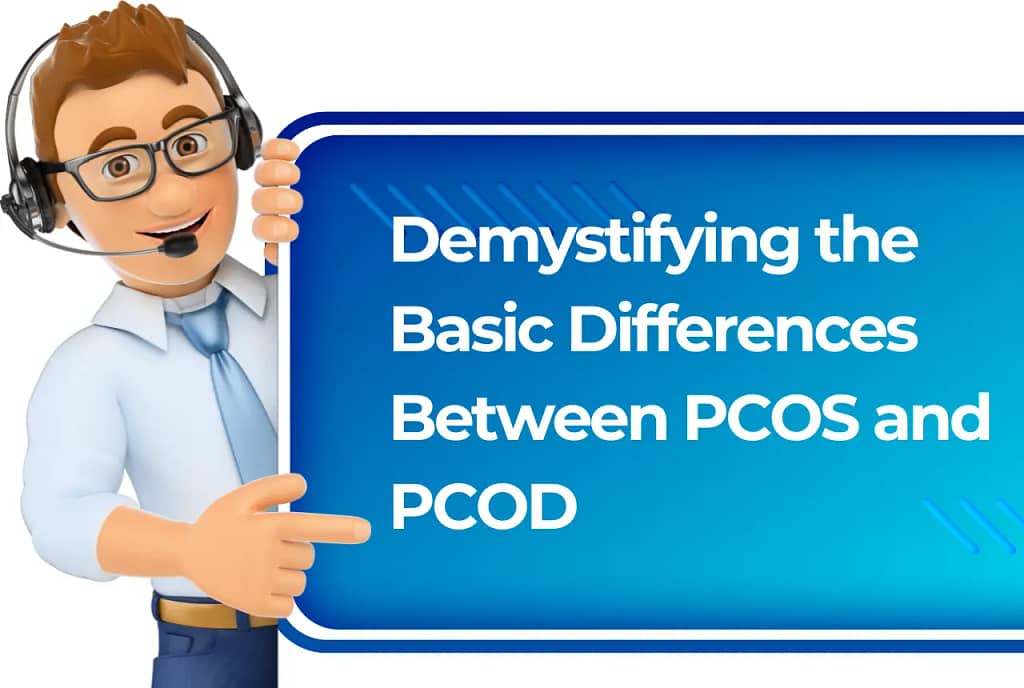There aren’t many differences between PCOS and PCOD. Polycystic Ovary Syndrome (PCOS) and Polycystic Ovarian Disease (PCOD) are terms often used interchangeably, yet certain key distinctions will be explained and discussed extensively in the blog.
Both conditions involve the presence of multiple small cysts on the ovaries, but their underlying causes and severity can differ. It is important to recognize these differences as receiving the most appropriate diagnosis and treatment plan becomes crucial.
Demystifying the Basic Differences Between PCOS and PCOD

Both the issues of PCOS (Polycystic Ovary Syndrome) and PCOD (Polycystic Ovarian Disease) share the presence of ovarian cysts, but there is a significant difference in underlying causes and severity.
Let us look into the five key differences by breaking them down into details.
- Underlying Cause: PCOS is known to stem from a hormonal imbalance, that leads to excessive androgen (male hormone) production in the ovaries. Whereas PCOD, on the other hand, is mostly caused by the development of immature eggs within the ovaries. The exact cause of PCOD remains under investigation, although hormonal factors might play a significant role.
- Impact on Fertility: Due to irregular ovulation or anovulation of PCOS can significantly impact fertility. Yet, when it comes to PCOD, women typically experience more regular ovulation cycles that could ease the issue and they may face less difficulty conceiving.
- Hormonal Imbalance: Characterized by significantly elevated androgen levels, PCOS can manifest or show up in symptoms like acne and excess hair growth. It is noticed that when compared even in PCOD the androgen levels may be slightly elevated, yet the level or degree may not be the same in contrast to PCOS.
- Long-Term Health Risks: Ranging from an increased risk of developing type 2 diabetes, heart disease, and other health problems – women tend to face these issues due to the hormonal imbalance caused by PCOS. Whereas when it comes to PCOD, it doesn’t typically pose most of these lives risking long-term health risks.
- Treatment: When it to the treatment of these medical conditions, PCOS often requires a combination of hormonal therapy, changes in lifestyle ranging from diet, exercise, and close medical monitoring. Whereas, when it comes to PCOD, it is often manageable effectively through focusing on certain tweaks and modifications in lifestyle alone, focusing on a healthy diet and exercise routines.
| Feature | PCOS (Polycystic Ovary Syndrome) | PCOD (Polycystic Ovarian Disease) |
| Underlying Cause | Hormonal imbalance, excess androgen production | Immature eggs, possible hormonal factors (cause under investigation) |
| Impact on Fertility | Can cause irregular ovulation and infertility challenges | Typically does not significantly affect fertility |
| Hormonal Imbalance | Significantly elevated androgen levels | May have slightly elevated androgens, but not to the same extent as PCOS |
| Long-Term Health Risks | Increased risk of type 2 diabetes, heart disease, and other health problems | Not typically linked to severe health risks |
| Treatment | Requires hormonal therapy, lifestyle changes, and close medical monitoring | Often managed with lifestyle modifications like diet and exercise |
1. Underlying Cause

Although it may look similar, the root causes of PCOS and PCOD have significant differences. When it comes to PCOS it is rooted in a hormonal imbalance.
In this type of medical issue, the ovaries normally produce androgens in small amounts, but when PCOS is highlighted, it is mostly seen that the hormone production goes into overdrive.
The excess production of androgen tends to disrupt the healthy development and release of eggs, which usually leads to irregular ovulation and the formation of cysts on the ovaries.
However, the development of immature eggs within the follicles of the ovaries is when PCOD seems to arise. During this process the immature eggs are sometimes unable to mature and be released properly, potentially contributing to cyst formation.
There are other suspected lifestyle factors like obesity or insulin resistance are also suspected to play a role in PCOD, but the exact cause is still under extensive investigation.
2. Impact on Fertility

The presence of cysts has a contrasting impact on fertility in PCOS and PCOD. In PCOS, the hormonal imbalance throws a wrench into the delicate dance of ovulation.
The excess androgen disrupts the process of egg maturation and release. This can lead to irregular ovulation or even anovulation (absence of ovulation entirely).
As a result, women with PCOS may experience difficulty conceiving or have longer times of pregnancy.
PCOD, however, tells a different story. While immature eggs might raise concerns, it typically doesn’t significantly affect fertility for most women.
Ovulation often occurs more regularly in PCOD, allowing for a higher chance of conception compared to PCOS.
3. Hormonal Imbalance
The hormonal landscape is vastly different in PCOS and PCOD. PCOS is defined by a significant imbalance, with the main culprit being elevated androgens. Androgens, typically considered male hormones, are also produced in small amounts by the ovaries in females.
However, in PCOS, the ovaries go into overdrive, making an excessive amount of androgens. This disrupts the delicate balance needed for proper egg development and ovulation.
The high androgen levels can manifest in symptoms like acne, excess hair growth, and irregular periods.
PCOD, while potentially involving hormonal factors, doesn’t exhibit the same degree of imbalance. Androgen levels in PCOD may be slightly elevated compared to normal levels, but nowhere near the significant increase seen in PCOS.
As a result, women with PCOD often experience fewer symptoms related to androgen excess.
4. Long-Term Health Risks

The long-term health outlook for PCOS and PCOD paints a contrasting picture. PCOS, due to the significant hormonal imbalance, carries an increased risk of developing certain chronic health conditions.
The excess androgen levels can contribute to insulin resistance, which in turn raises the risk of type 2 diabetes.
Additionally, the hormonal disruptions associated with PCOS can increase the risk of developing heart disease and certain cancers, like endometrial cancer.
PCOD, however, doesn’t typically pose the same long-term health risks. Since the hormonal imbalance is less severe, the risk factors for conditions like type 2 diabetes and heart disease are not as pronounced.
This doesn’t negate the importance of good health practices, but the overall risk profile for PCOD is generally less concerning compared to PCOS.
5. Treatment Options

The treatment for PCOS and PCOD takes different paths based on the underlying causes. PCOS, with its hormonal imbalance, often requires a multi-pronged approach.
Hormonal therapy, such as birth control pills or medications that regulate ovulation, can help address the androgen excess and regulate menstrual cycles.
Additionally, lifestyle changes play a crucial role in managing PCOS. Maintaining a healthy weight through diet and exercise can improve insulin sensitivity and potentially restore ovulation naturally.
PCOD, on the other hand, often doesn’t require hormonal intervention. Management typically focuses on lifestyle modifications to promote overall health and potentially improve ovulation.
Maintaining a healthy weight through a balanced diet and regular exercise can be highly beneficial. In some cases, supplements like vitamin D or omega-3 fatty acids might be recommended, but these would depend on individual needs.
Conclusion (100 words)
Understanding the key differences between PCOS and PCOD is crucial for receiving the most appropriate diagnosis and treatment. While both conditions involve ovarian cysts, their root causes and severity differ significantly.
Consulting a healthcare professional is essential for a proper evaluation and personalized treatment plan. By working with your doctor, you can manage your condition effectively and take control of your health journey.

